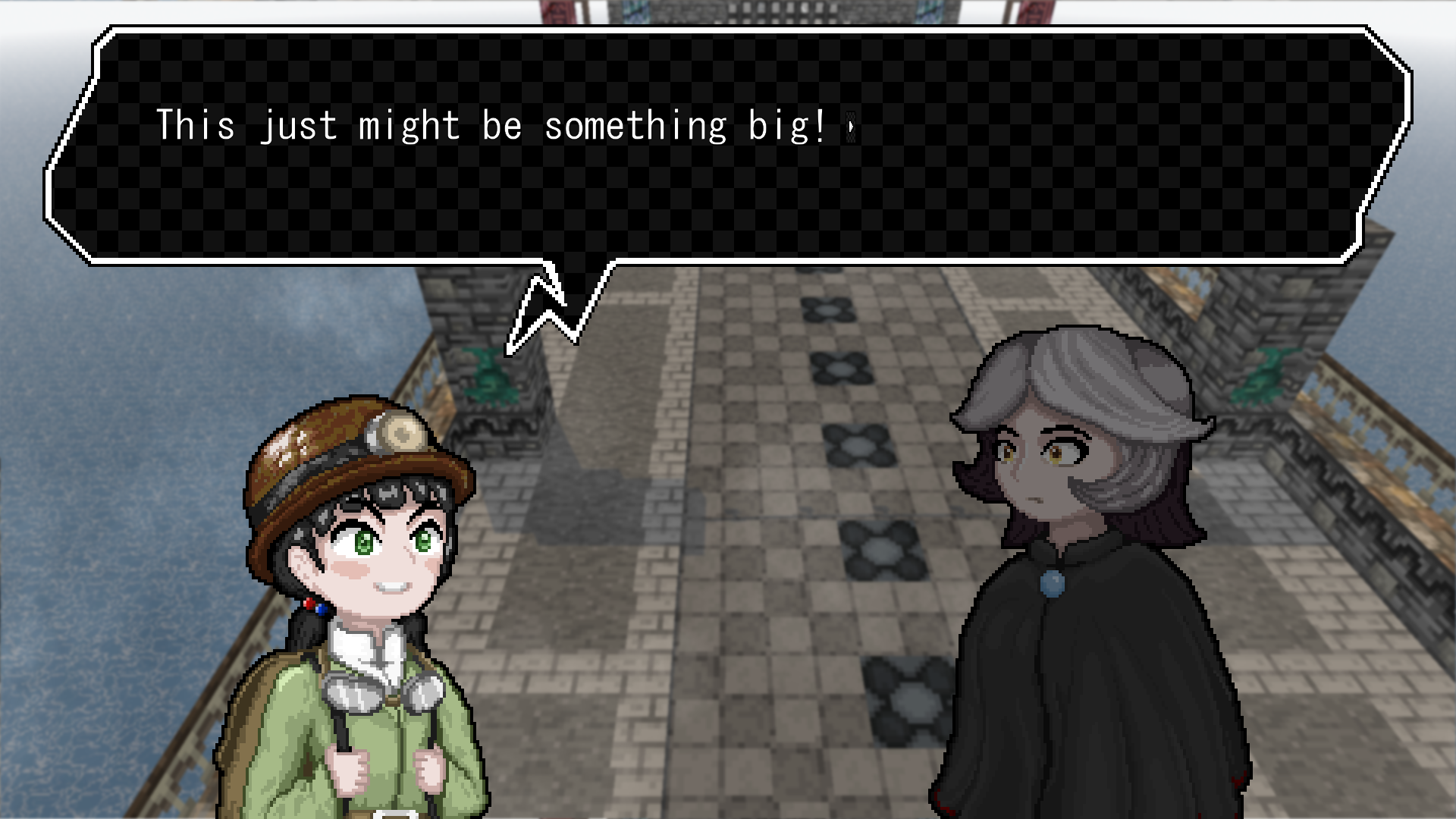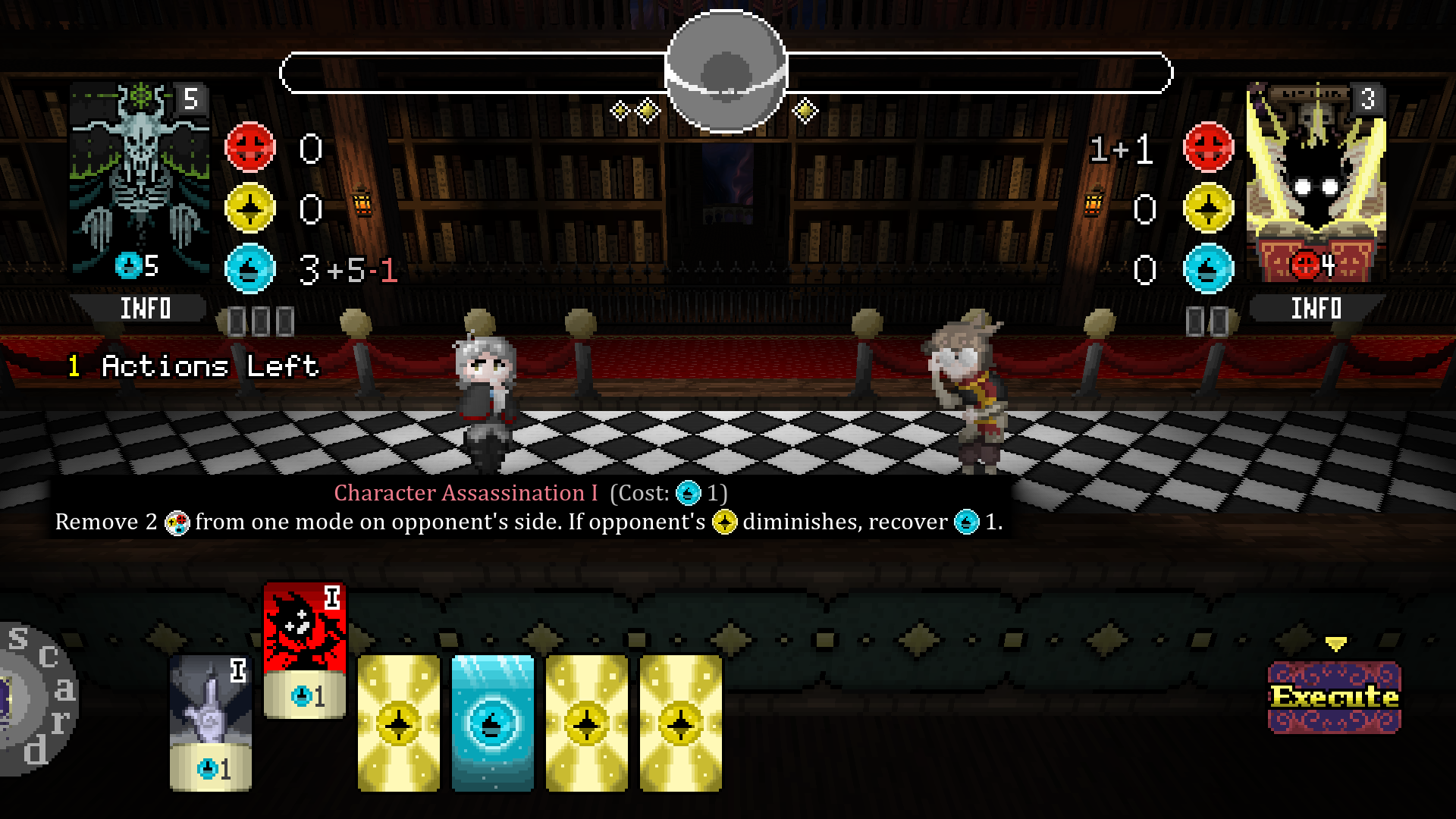Development Notes #7 | Second Layer Beta, Gameplay Improvements

Hello, this is Garrett Thompson, sole member of Act-Novel.
It's been "radio silence" from me about the Second Layer since late last year, so I'm going to open this Development Notes entry with this unambiguous declaration: the Second Layer is, at this time of writing, entirely complete.
It isn't quite ready for release yet, since there's still a bit of testing that needs to be done. It may be more accurate to say that it's "in beta" at the moment. Still, everything that needs to be finished prior to release has, at this time, been finished. Thus, the release of the second layer is imminent, and, barring any last-minute revisions, will be announced (here and elsewhere) in the next-- oh, say-- week or two. I expect the update will be public before the end of April, but I'm reluctant to commit to that right now out of fear of Murphy's Law, among other time estimation gadflies.
For those of you who've been waiting patiently for this, I extend my heartfelt thanks for your continued interest.
There is, perhaps, an enthralling (hypothetical) Development Notes entry to be written about why I overshot my initial estimate (of about 8-10 months) by one-third of a year. However, that is not the topic I've chosen to write about for this entry. I'll simply state, in short-form explanation, that the second layer is nearly twice as long as the first by word-count, with over twice as many wholly-optional scenes! It more than doubles the number of debates in the game and similarly expands the number of individual debate opponents! It also expands the soundtrack by around 50%, bringing the track total to over 30! It's a really big update!!
In the interest of expediency, as well as my own personal sanity, the length of the next part may be made to adhere more analogously to the length of the first. With any luck, that will make for a shorter development period-- but, as with all things in game development, there's no knowing if that will be the case! I'll restrain myself from announcing a public release date prediction for now, but I'm staying hopeful.
At any rate, the actual topic of this Development Notes entry is to discuss various improvements to the "core gameplay" of the debating system that will be introduced when the Second Layer releases. I will assume a degree of familiarity with the debating system as it is implemented currently.
-- Second Layer Debating System Refinements --

One consistent bit of negative feedback I've received about the debating system is that debates take too long, and that it's easy to get stuck in a repetitive back-and-forth with the opponent. I haven't heard this complaint from everyone, but enough people have expressed this sentiment that I felt it warranted a gentle re-evaluation of the system that exists currently.
Ultimately, I found that the main issue impacting the length of debates is that the computer opponents the player faces tend to be too "relentless" in playstyle. Consider the following scenario:
Turn 1:
- The opponent summons +2 Ethos in preparation for playing a 1E rhetoric card.
Turn 2:
- The player criticizes the opponent's Ethos for 2E damage.
- With nothing else to do, the opponent summons +2 Ethos again.
Turn 3:
- The player does [some non-criticism action]
- The opponent plays the rhetoric card they intended to play on turn 2, one turn later.
As you can see, despite doing everything "right", the player was only able to stall the opponent by one turn. This is certainly better than nothing, but tends to feel somewhat unrewarding, since a well-placed criticism cannot produce as-dramatic "swings" in the game state as may be desired-- given that the opponent can undo the effects thereof in a single action.
(It is possible, of course, for the above scenario to result in a "forced discard action", in which the opponent will not be able to simply re-summon on turn 2. However, in the debate system implemented for the first public release (version 0.1.6), for reasons a bit caught-up in the minutiae of implementation, this happens only rarely.)
Let's also consider the reverse of this scenario:
Turn 1:
- The player summons +2 Ethos in preparation for playing a 1E rhetoric card. The player's current hand has now been depleted of Ethos.
- The opponent criticizes the player's Ethos.
Turn 2:
- The player draws 2 cards to replace the Ethos premises summoned last turn. Neither card is a new Ethos premise, and so the player's hand is devoid of new Ethos. To proceed with the plan from last turn, the player has no choice but to discard some quantity of held cards.
- The opponent [does some non-criticism action]
Turn 3:
- Following their previous discard action, the player draws some quantity of Ethos premises equal-to-or-greater-than 1. The player uses these cards to summon +1 Ethos.
- The opponent [does some other non-criticism action]
Turn 4:
- Only now is the player able to execute on the plan from Turn 1 and play the 1E rhetoric card.
- The opponent, now significantly advantaged from two consecutive turns of "downtime", may have built out a very comfortable defensive position, or may be able to resonate, or may be able to criticize the player again to keep stalling for time.
This cycle may repeat for an extended period, and can be frustrating to deal with, particularly while only using the "simple" rhetoric available in the First Layer. It's not guaranteed to happen, and can be mitigated by strong deck composition, but is entirely within the bounds of reasonable play to encounter.
The core problem that I identified is that there's a certain asymmetry to the contest here. A player will often be disrupted by a well-placed criticism from the opponent, but a computer opponent will, most times, be able to continue with little lost time.
The primary cause of this is that, in order to facilitate a more consistent single-player challenge, the computer opponent is allowed to "cheat" and, in effect, draw a set of fixed hands rather than totally random ones. (The reality of the implementation is a bit more complicated than this, but this is an acceptable way of thinking about it for now)
Thus, the computer will almost always have access to some viable move, where the player sometimes only has junk.
To compensate for this imbalance, I've introduced an effective rule to the computer opponent that requires a discard action be played before a re-summoning action can occur. Thus, the player can now more effectively and consistently stall the opponent by simply keeping the opponent's premises in-check.
An aside: From time to time, you'll still see scenarios where the opponent will appear to re-summon without discarding first. This happens when the opponent's next move (according to their fixed hand) was "supposed to be" to summon more premises. Since summoning premises is a no-cost action, it's impossible to prevent this by depriving the opponent of premises-- thus, no discard action is required.
This rule need not always be applied, since it does undeniably make the debates easier. I may actually turn it off for later debates where heightened challenge is desirable (it's toggleable!)-- but for now, in the early game, when the decks you're playing are still so relatively simple, sacrificing challenge in exchange for consistency is, I think, a reasonable trade-off.
This change is, of course, not a panacea. The player may still get stuck or over-stalled. A debate may still drag on for uncomfortably long. There's no instant fix for this-- only incremental balance changes to be applied, tested, and refined. To that end, I've also generally increased the weights of all argument cards (although not at all levels) and decreased the resistances of most first-layer opponents. This is to allow effective players to win faster. I've also adjusted the player's own resistance down slightly, such that a player running a weak deck will lose faster, and thus learn the flaws in their strategy without spending as much time fighting a losing uphill battle.
My general goal for time is that a "regular" debate should take no more than five minutes to complete, and a "boss battle" should rarely take more than 10 (and certainly no more than 15-- although, this may vary by reading speed). The changes described above contribute to making that a reality, but it's entirely possible that the solution I've arrived at is imperfect. Thus, I remain open to criticism and feedback-- if you have anything to say about the gameplay adjustments to-be-introduced in the second layer, feel free to send me an email at developer@act-novel.com, or start a thread on the Steam community! (You can also just comment your thoughts below!)
With all of that said, I will now return to testing and preparing the Second Layer for public release. Please, continue to look forward to it!
Get Reality Layer Zero
Reality Layer Zero
Occult Debating RPG
| Status | In development |
| Author | Act-Novel |
| Genre | Card Game, Role Playing, Visual Novel |
| Tags | 3D, debate, Horror, JRPG, Mystery, Pixel Art, Singleplayer, Thriller |
| Languages | English |
| Accessibility | Configurable controls, Interactive tutorial |
More posts
- Patch Notes #5 | 11/25/202519 days ago
- Patch Notes #4 | 10/12/202564 days ago
- v0.4 Release87 days ago
- v0.4 Release Date Announcement94 days ago
- Development Notes #12 | One More Thing...Aug 28, 2025
- Development Notes #11 | Background SchoolMay 18, 2025
- Development Notes #10 | New Year, New ArtJan 01, 2025
- Development Notes #9 | What's Coming Up NextAug 09, 2024
- Patch Notes #3 | 06/09/2024Jun 09, 2024
- Music from the Second Layer is now available on YouTubeJun 03, 2024

Comments
Log in with itch.io to leave a comment.
I just found this article! I must have missed it in my inbox.
I love that you're trying to fix the combat. The adjustments are much appreciated. My debates still take over 15 minutes most of them time, but I'm also very methodical. So I think that's a good sign it's working!